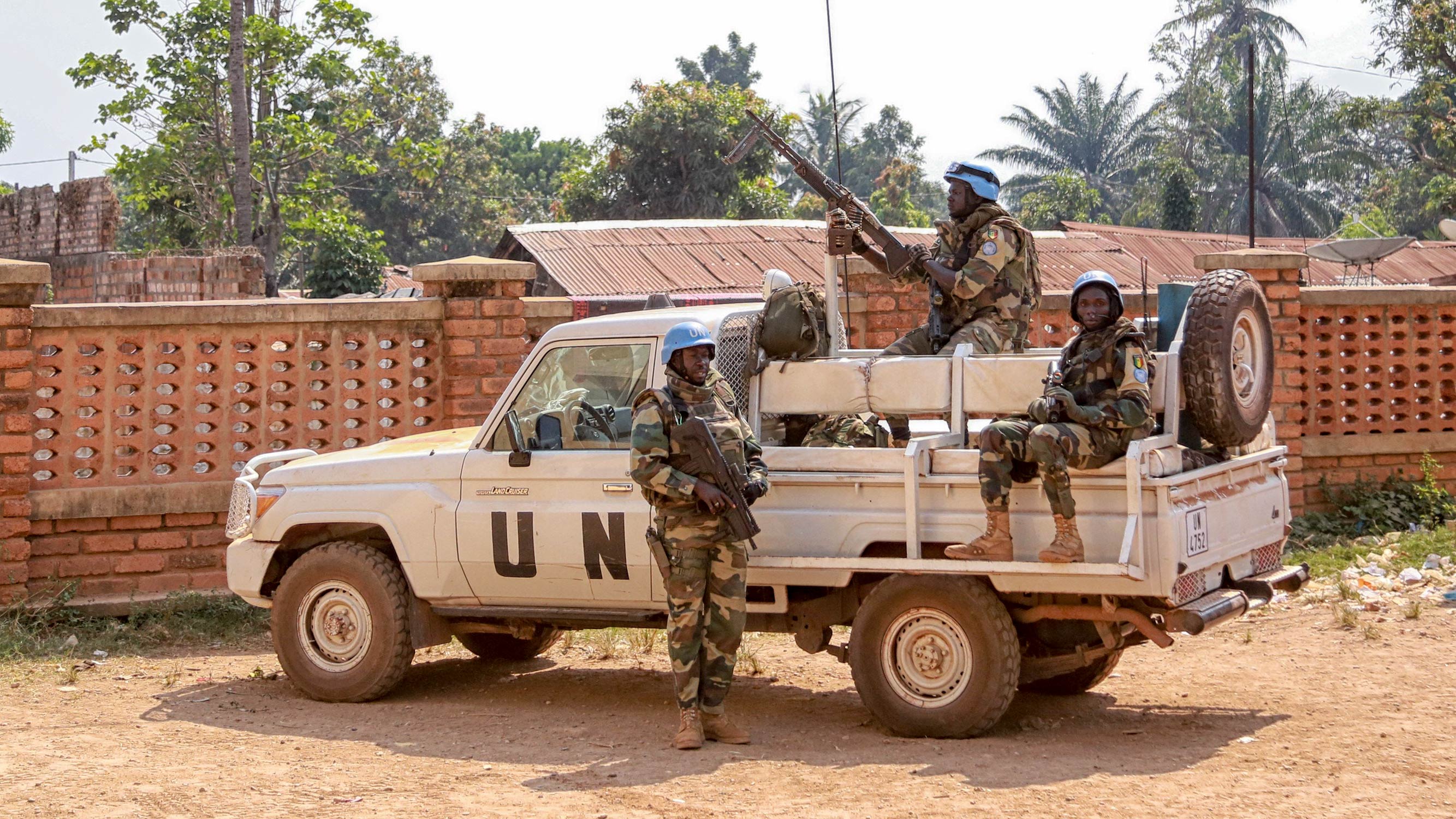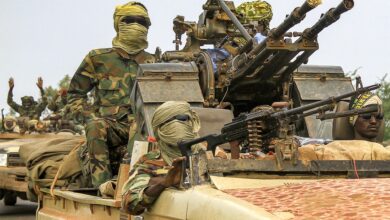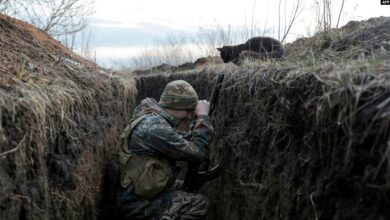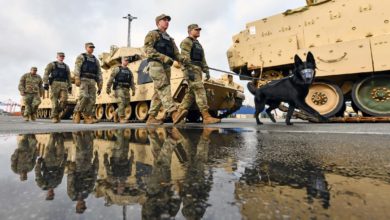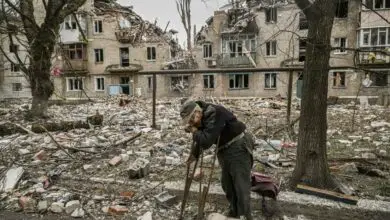Updated April 11
At least 18 people including a United Nations peacekeeper were killed and more than 100 injured in clashes in the mainly Muslim PK5 district of Bangui, capital of Central African Republic, as a joint U.N.-Central African forces operation against armed groups continues.
Bangui’s bloodiest flareup in two years brought hundreds of angry residents of PK5 to the headquarters of the U.N.’s Minusca mission on Wednesday.
Residents of the PK5 enclave laid out the bodies of 17 men in front of the base, saying they had been killed by peacekeepers in clashes on Tuesday with local armed groups. Several U.N. armored vehicles were stationed around the Minusca base.
“Yesterday they killed lots of people. Here are the dead, which we have brought here,” one man told AFP, as the bodies, draped in white, were laid before the closed door of the mission. Several of the bodies had bullet wounds, AFP reported.
The Red Cross quickly removed the bodies, the Associated Press reported.
According to AP, the president of the neighborhood merchants’ association Djibrine Youssouf said another four bodies of civilians and four bodies of members of armed groups were left at a mosque in PK5.
Atahirou Balla Dodo, mayor of the Bangui district in which PK5 is located, told Reuters that a total of 21 people were killed – the 17 whose bodies were brought to the Minusca headquarters, while four others, including two women and two children, were brought to a mosque.
Bangui public hospital treated 56 injured people, one of whom subsequently died, according to staff there, while aid group Medecins Sans Frontieres (Doctors Without Borders) said it treated 44 wounded.
Minusca said one U.N. soldier was killed and eight others were wounded in Tuesday’s violence, adding to 11 peacekeepers and dozens of other people injured on Sunday.
Spokesperson Vladimir Monteiro said Minusca troops targeted criminal gangs, denying they had fired on civilians.
“This is not an operation against communities and specifically the Muslim community. The Muslim community asked our troops to launch the operation and put an end to the criminal activities,” Monteiro said, Reuters reported.
He also criticised Wednesday’s demonstrators, saying: “We regret the fact that the bodies were being manipulated while they should be buried like every person who dies.”
In a statement, Central African Republic’s defense minister said the country’s armed forces had not been involved and urged residents of the capital to remain calm, AP reported.
The U.N.’s Under-Secretary-General for Peacekeeping Operations Jean-Pierre Lacroix and the African Union’s commissioner for peace and security, Smail Chergui, who are visiting the country to promote peacemaking goals, issued a joint statement on Wednesday appealing for calm.
The A.U. last July agreed to launch an “African peace initiative” for CAR, consisting of a round-table gathering armed groups and the government. Earlier in April, A.U. facilitators said they had finished a round of meetings with the 14 recognised armed groups, and round-table talks would begin in “a few weeks.”
Speaking after meeting the U.N. and A.U. delegation, President Faustin-Archange Touadera said “Bandits have taken the population hostage.”
“This operation has as its sole objective the apprehension of the leaders (of the armed militias). It is not against one community or against the population” of the area, he added.
Operation against armed groups in Bangui’s PK5
On April 1, U.N. peacekeepers exchanged fire with members of an armed group in PK5, the first attack on U.N. troops since violence resumed in the neighborhood in 2017.
On April 8, U.N. and Central African forces launched the “disarmament and arrest” operation targeting armed groups in PK5.
At least two people were killed and dozens wounded during the first day of the operation, according to U.N. and medical sources. Minusca spokesperson Herve Verhoosel said 11 peacekeepers, mostly Egyptian, were among the injured.
The joint force raided the bases of several groups, resulting in the seizure of arms, ammunition, and drugs, Minusca said. Eight people belonging to the armed groups Force and 50/50 were detained, Verhoosel told AFP.
Later that day, gunfire was exchanged after U.N. troops were targeted near the president’s residence in Bangui, just hours after the operation began.
On April 10, one U.N. peacekeeper was killed and eight others wounded in clashes in PK5, after their patrol was ambushed on the outskirts of the neighbourhood, a security source told AFP.
“A Rwandan patrol supported by Central African forces was shot at and then pursued the attackers into PK5,” the source said.
Minusca says one of the injured peacekeepers is in a critical condition.
PK5’s population was previously supportive of the armed groups, which came from a desire to protect their neighbourhoods in the country’s civil war, but recently they have been accused of intimidation and extorting protection money, and Minusca considers them criminal.
Minusca said it would dismantle all the armed groups’ bases unless they hand over their weapons, but the groups’ leaders refused, despite a mediation organized by community leaders.
“This joint operation will continue until the criminal groups of PK5 are dismantled or otherwise disappear,” Minusca said.
Resource-rich nation blighted by poverty and sectarian violence
Although rich in diamonds, gold, oil and uranium, the former French colony of 4.5 million people has one of the world’s poorest populations, and has been blighted by violence and instability since gaining independence in 1960.
In March 2013, Séléka, a mainly Muslim alliance, overthrew CAR’s leader Francois Bozizé, which led to a spiral of violence between Muslim and Christian militias in which thousands died.
Many joined the mainly-Christian anti-balaka militia to fight the Seleka rebels. Muslims either fled the capital or took refuge in PK5, where the population funded the creation of their own self-defence groups, most of whom were former Seleka rebels, to defend from anti-balaka vigilante attack.
The weak government only controls around a fifth of the Central African Republic. The rest of the territory is controlled by militia groups. Many are nominally organised along religious lines, but they often fight for control of revenue from extortion, roadblocks or mineral resources.
President Faustin-Archange Touadera, a former prime minister who campaigned as a peacemaker, was declared the winner of a 2016 election perceived as crucial to transitioning from years of sectarian violence.
The recent clashes marked the bloodiest incident in Bangui since Touadera was elected.
“When President Touadera was on the campaign trail, he promised us that he would not touch a hair on a Muslim’s head if we voted for him, which we did. Now you can see the results,” said one of the demonstrators, who gave his name as Riyad.
Launched in 2014, Minusca is considered one of the U.N.’s most dangerous peacekeeping missions.
On April 2, one U.N. peacekeeper from Mauritania was killed and 11 others were wounded and more than 22 anti-balaka fighters were killed when a temporary U.N. base in Tagbara came under heavy militia attack.
Minusca said it later discovered the bodies of 21 civilians, including four women and four children, near a church, and that the deaths resulted from a separate incident that used “traditional weapons,” indicating machetes or knives.
With reporting from AFP
This post was updated multiple times on April 11 to include additional information

